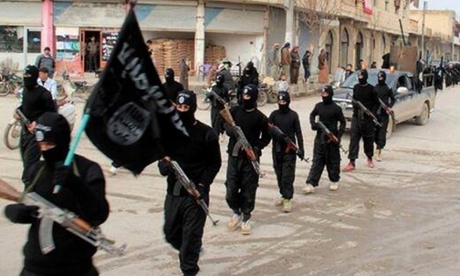Free Chelsea Manning Now!
How to make Isis fall on its own sword
Degrade and destroy? The west should try to disrupt the canny militants into self-destruction, because bombs will only backfire

The Islamic State (Isis) is without question a very brutal extremist group with origins in the insurgency of the United States occupation of Iraq. It has rapidly ascended to global attention by taking control of swaths of territory in western and northern Iraq, including Mosul and other major cities.
Based on my experience as an all-source analyst in Iraq during the organization’s relative infancy, Isis cannot be defeated by bombs and bullets – even as the fight is taken to Syria, even if it is conducted by non-Western forces with air support.
I believe that Isis is fueled precisely by the operational and tactical successes of European and American military force that would be – and have been – used to defeat them. I believe that Isis strategically feeds off the mistakes and vulnerabilities of the very democratic western states they decry. The Islamic State’s center of gravity is, in many ways, the United States, the United Kingdom and those aligned with them in the region.
When it comes to regional insurgency with global implications, Isis leaders are canny strategists. It’s clear to me that they have a solid and complete understanding of the strengths and, more importantly, the weaknesses of the west. They know how we tick in America and Europe – and they know what pushes us toward intervention and overreach. This understanding is particularly clear considering the Islamic State’s astonishing success in recruiting numbers of Americans, Britons, Belgians, Danes and other Europeans in their call to arms.
Attacking Isis directly, by air strikes or special operations forces, is a very tempting option available to policymakers, with immediate (but not always good) results. Unfortunately, when the west fights fire with fire, we feed into a cycle of outrage, recruitment, organizing and even more fighting that goes back decades. This is exactly what happened in Iraq during the height of a civil war in 2006 and 2007, and it can only be expected to occur again.
And avoiding direct action with Isis can be successful. For instance, in 2009 and 2010, forerunners to the Isis group attacked civilians in suicide and car bombings in downtown Baghdad to try and provoke American intervention and sectarian unrest. But they were often not effective in their recruiting efforts when American and Iraqi forces refused (or were unable) to respond, because the barbarity and brutality of their attacks worked against them. When we did respond, however, the attacks were sold to the Sunni minority in Iraq as a justified response to an occupying government favoring the Shia government led by former prime minister Nouri al-Maliki.
Based on my intelligence work in Iraq during that period, I believe that only a very focused and consistent strategy of containment can be effective in reducing the growth and effectiveness of Isis as a threat. And so far, Western states seem to have adopted that strategy. With very public humanitarian disasters, however, like the ones on Mount Sinjar and Irbil in northern Iraq, and the beheadings of journalists James Foley and Steven Sotloff, this discipline gets tested and can begin to fray.
As a strategy to disrupt the growth of Isis, I suggest focusing on four arenas:
But the world just needs to be disciplined enough to let the Isis fire die out on its own, intervening carefully and avoiding the cyclic trap of “mission creep”. This is certainly a lot to ask for. But Isis is wielding a sharp, heavy and very deadly double-edged sword. Now just wait for them to fall on it.
More from Guardian US on Isis:
Based on my experience as an all-source analyst in Iraq during the organization’s relative infancy, Isis cannot be defeated by bombs and bullets – even as the fight is taken to Syria, even if it is conducted by non-Western forces with air support.
I believe that Isis is fueled precisely by the operational and tactical successes of European and American military force that would be – and have been – used to defeat them. I believe that Isis strategically feeds off the mistakes and vulnerabilities of the very democratic western states they decry. The Islamic State’s center of gravity is, in many ways, the United States, the United Kingdom and those aligned with them in the region.
When it comes to regional insurgency with global implications, Isis leaders are canny strategists. It’s clear to me that they have a solid and complete understanding of the strengths and, more importantly, the weaknesses of the west. They know how we tick in America and Europe – and they know what pushes us toward intervention and overreach. This understanding is particularly clear considering the Islamic State’s astonishing success in recruiting numbers of Americans, Britons, Belgians, Danes and other Europeans in their call to arms.
Attacking Isis directly, by air strikes or special operations forces, is a very tempting option available to policymakers, with immediate (but not always good) results. Unfortunately, when the west fights fire with fire, we feed into a cycle of outrage, recruitment, organizing and even more fighting that goes back decades. This is exactly what happened in Iraq during the height of a civil war in 2006 and 2007, and it can only be expected to occur again.
And avoiding direct action with Isis can be successful. For instance, in 2009 and 2010, forerunners to the Isis group attacked civilians in suicide and car bombings in downtown Baghdad to try and provoke American intervention and sectarian unrest. But they were often not effective in their recruiting efforts when American and Iraqi forces refused (or were unable) to respond, because the barbarity and brutality of their attacks worked against them. When we did respond, however, the attacks were sold to the Sunni minority in Iraq as a justified response to an occupying government favoring the Shia government led by former prime minister Nouri al-Maliki.
Based on my intelligence work in Iraq during that period, I believe that only a very focused and consistent strategy of containment can be effective in reducing the growth and effectiveness of Isis as a threat. And so far, Western states seem to have adopted that strategy. With very public humanitarian disasters, however, like the ones on Mount Sinjar and Irbil in northern Iraq, and the beheadings of journalists James Foley and Steven Sotloff, this discipline gets tested and can begin to fray.
As a strategy to disrupt the growth of Isis, I suggest focusing on four arenas:
- Counter the narrative in online Isis recruitment videos – including professionally made videos and amateur battle selfies – to avoid, as best as possible, the deliberate propaganda targeting of desperate and disaffected youth. This would rapidly prevent the recruitment of regional and western members.
- Set clear, temporary borders in the region, publicly. This would discourage Isis from taking certain territory where humanitarian crises might be created, or humanitarian efforts impeded.
- Establish an international moratorium on the payment of ransom for hostages, and work in the region to prevent Isis from stealing and taxing historical artifacts and valuable treasures as sources of income, and especially from taking over the oil reserves and refineries in Bayji, Iraq. This would disrupt and prevent Isis from maintaining stable and reliable sources of income.
- Let Isis succeed in setting up a failed “state” – in a contained area and over a long enough period of time to prove itself unpopular and unable to govern. This might begin to discredit the leadership and ideology of Isis for good.
But the world just needs to be disciplined enough to let the Isis fire die out on its own, intervening carefully and avoiding the cyclic trap of “mission creep”. This is certainly a lot to ask for. But Isis is wielding a sharp, heavy and very deadly double-edged sword. Now just wait for them to fall on it.
More from Guardian US on Isis:
- Pentagon: US ground troops may join Iraqis in combat against Isis
- Hagel and Dempsey testify to Senate on Isis threat – live
- Trevor Timm: Is Obama’s Forever War against Isis legal?
- Plus: The sad legacy of 9/11 – Isis and al-Qaida are stronger than ever
- Back story: Chelsea Manning breaks silence to criticise Obama’s Isis strategy

No comments:
Post a Comment